
President Donald Trump sits at his desk in the Oval Office of the White House in Washington, Monday, January 23, 2017.
United States officials are reportedly concerned that Trinidad and Tobago nationals who have joined ISIS could return and pose a threat to US interests.
Following President Donald Trump’s call to Trinidad and Tobago Prime Minister Dr Keith Rowley over the weekend, the New York Times carried a report in which it outlined the US concern about the twin-island republic, a country described as “a breeding ground for extremists”.
The article, entitled ‘Trying to Stanch Trinidad’s Flow of Young Recruits to ISIS’, quoted a White House spokeswoman, Sarah Huckabee Sanders, as saying that in that weekend telephone conversation, they spoke about terrorism and other security challenges, including foreign fighters.
Trump, who campaigned on an explicit ban of all Muslims from entering the United States, recently moved to prevent citizens of seven majority-Muslim countries – Iran, Iraq, Syria, Sudan, Libya, Yemen and Somalia – from entering the US for an initial period of 90 days. However, that ban was blocked by the courts. Trump will next week sign a new executive order for an updated travel ban that will address some of the issues brought up in the courts. Homeland Security Secretary John Kelly said it will be a “tighter, more streamlined version of the first executive order”.
“American officials worry about having a breeding ground for extremists so close to the United States, fearing that Trinidadian ISIS fighters could return from the Middle East and attack American diplomatic and oil installations in Trinidad, or even take a three-and-a-half-hour flight to Miami,” the New York Times article stated.
It pointed to Trinidad’s history of Islamist extremism – specifically the failed coup by a radical Muslim led by Yasin Abu Bakr in 1990; a Trinidadian jailed for life in the US for his role in a plot to blow up Kennedy International Airport; and that 130 people have made the trip to Syria join ISIS from Trinidad.
It also noted that, according to former US Ambassador to Trinidad John Estrada, Trinidad has the greatest number of foreign fighters per capita from the Western Hemisphere who have joined the Islamic State.
In fact, the New York Times quoted Juan S. Gonzalez, a former deputy assistant secretary of state for Western Hemisphere affairs, as saying that the bulk of Islamic State fighters from Latin America originated in the twin-island republic and the numbers underscore a risk of lone-wolf attacks in the region.
“Is the Caribbean, Trinidad and Tobago, the United States, prepared for these guys to return back to their countries? This is a real vulnerability,” he warned.
